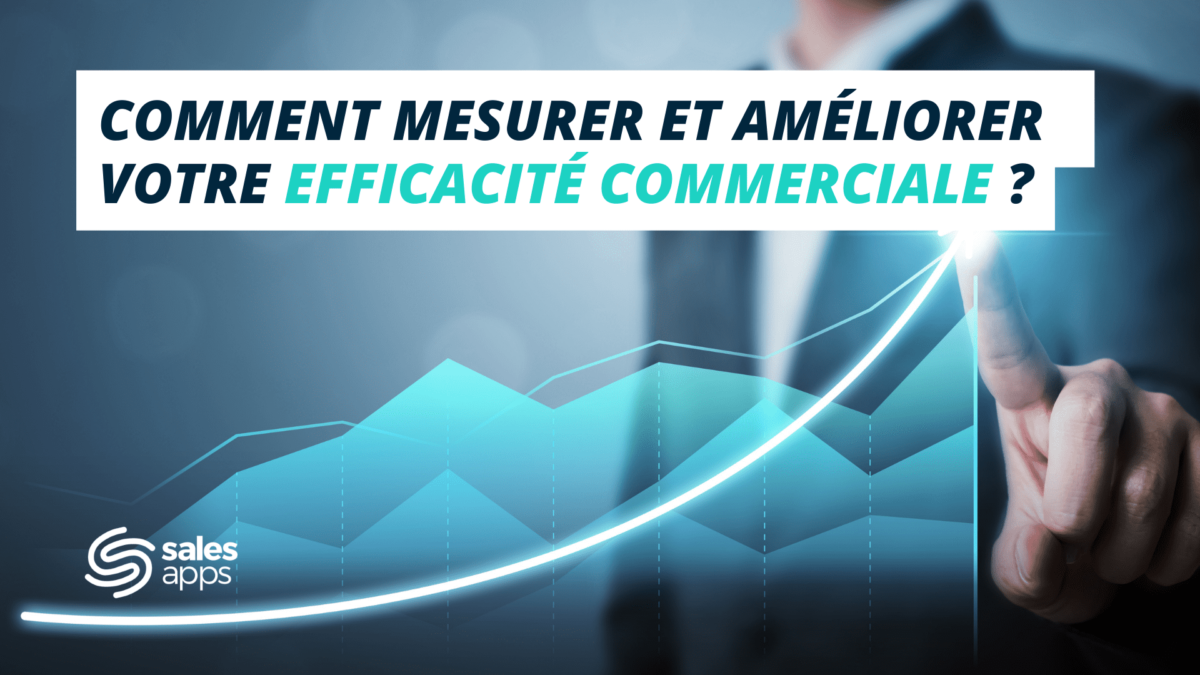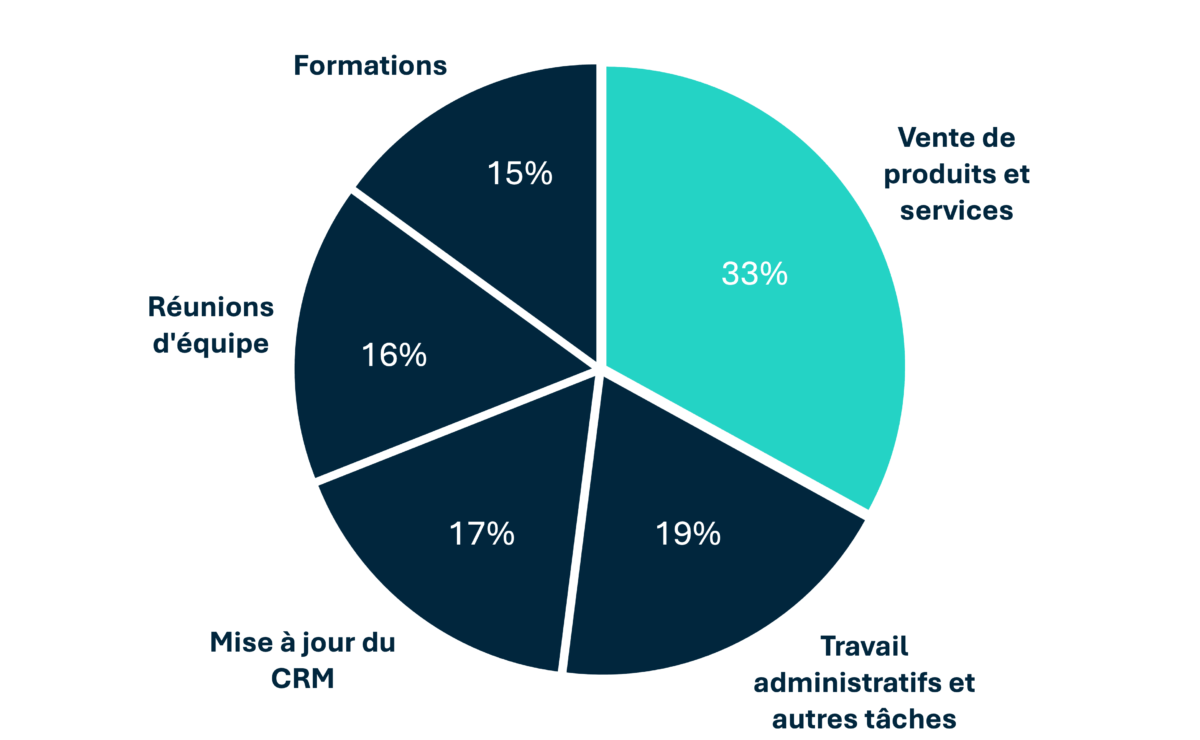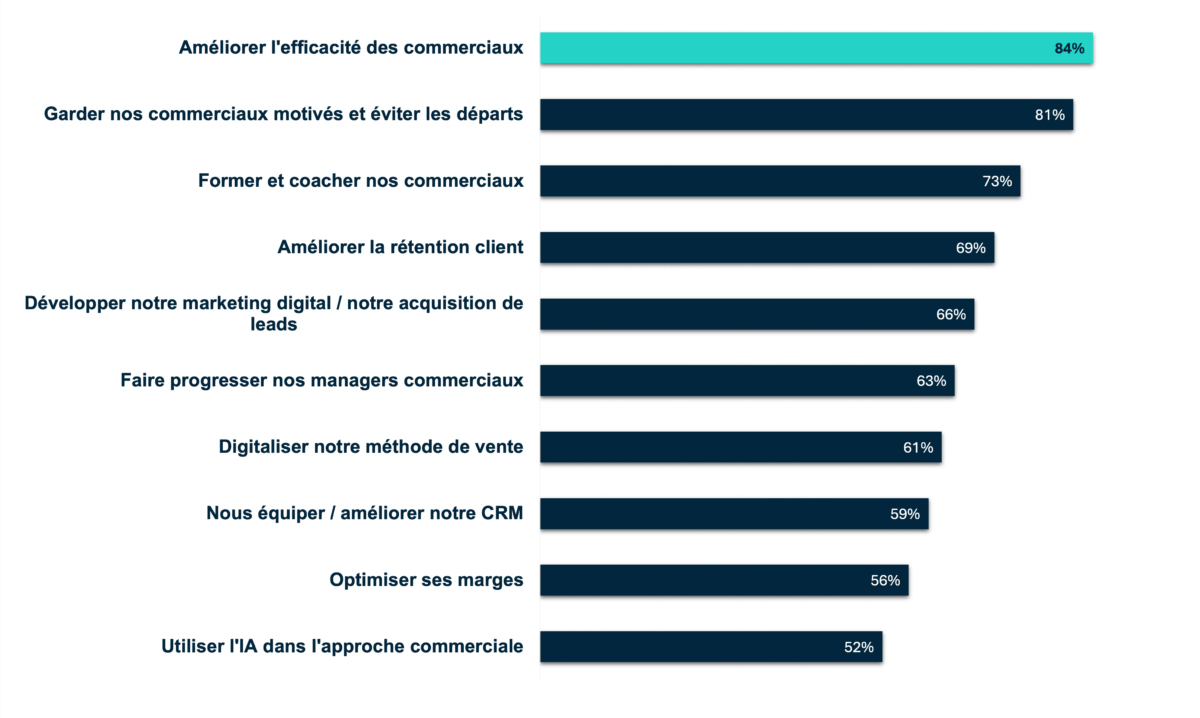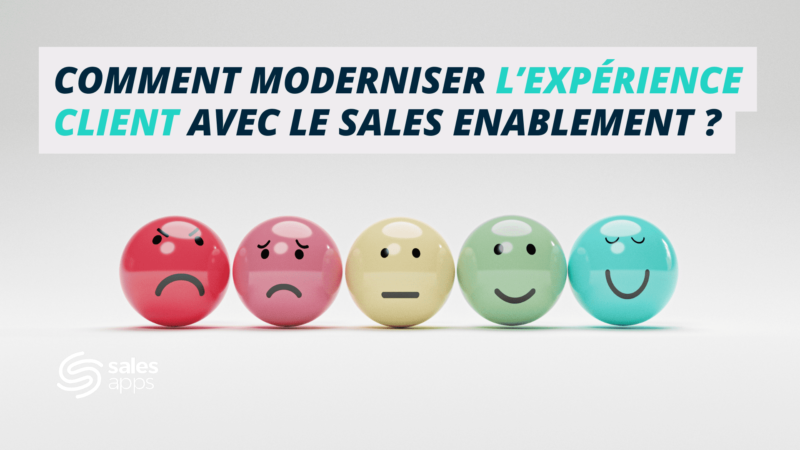
Blog
Comment mesurer et améliorer votre efficacité commerciale ?

Améliorer l’efficacité commerciale, c’est faire en sorte que la force de vente consacre plus de temps sur des tâches liées à la vente ! Est-ce le cas ? La vente est-elle vraiment au cœur de votre activité commerciale ? La réponse est malheureusement non ! C’est du moins ce que souligne LinkedIn dans son dernier rapport sur les tendances des ventes (State of Sales), en mettant en avant que le commercial passe près de 67 % de son temps sur des activités non liées à la vente.

Au cœur du problème, l’alignement vente & marketing et des outils inadaptés synonymes de perte de temps ! Les dirigeants, les marketeurs et les commerciaux partagent ce constat et semblent largement sensibilisés au coût d’opportunité du désalignement et au manque à gagner généré par l’organisation en silos. Forrester témoigne de ce constat : 85 % des décideurs B2B concèdent que l’alignement Sales et Marketing reste « la plus grande opportunité d’amélioration de la performance ». La performance d’une équipe commerciale dépend de son efficacité au quotidien, et cette efficacité dépend de la capacité des organisations à s’aligner. Concrètement, si le marketing n’accompagne pas le commercial en modernisant ses techniques de vente, il passera toujours trop de temps sur des tâches non liées à la vente… Forbes estime ce coût à 68 352 $ par an et par commercial chez les entreprises américaines. Comment aligner les équipes sales & marketing ? Quelles solutions s’offrent aux directions commerciales ? Comment faire pour que le commercial passe plus de temps sur son cœur de métier ? Comment mesurer et améliorer l’efficacité commerciale ?
Qu’est-ce que l’efficacité commerciale ?

L’efficacité commerciale évalue la performance des commerciaux à chaque étape du cycle de vente. Elle est étroitement liée à la notion de temps. Avant le rendez-vous, on peut évaluer l’efficacité commerciale en fonction du temps passé par un commercial à la recherche de contenus ou à la création de présentations commerciales personnalisées ? Pendant le rendez-vous, a-t-il accès rapidement aux informations dont il a besoin pour vendre ? Apporte t’il les bonnes réponses au bon moment ? Et après le rendez-vous, combien de temps passe-t-il sur la collecte de données et l’enrichissement du CRM ? Plus le temps passé sur ces tâches est réduit, plus l’efficacité commerciale sera améliorée, car davantage de temps sera alloué à la vente.
Il existe différents KPIs pour mesurer l’efficacité commerciale. Prenons le cas de l’avant rendez-vous en phase de prospection : pour évaluer l’efficacité d’un commercial, un directeur peut suivre au cours d’une période prédéfinie (journée, semaine, mois..) des KPIs comme le volume de contacts initiés, le nombre de contacts argumentés ou qualifiés, le nombre de rendez-vous et bien sûr de propositions envoyées.
L’efficacité commerciale : l’enjeu N°1 des directions commerciales !

Pour l’année 2024, toutes les directions sont unanimes : elles vont travailler sur l’efficacité des commerciaux. C’est ce que souligne l’étude d’Uptoo en précisant les trois principaux enjeux des directions commerciales. En première place, on retrouve l’efficacité commerciale (84 %), suivie de près par la motivation et la lutte contre le turnover des commerciaux (81 %), et en troisième place la formation et le coaching commercial (73 %).

Les directions commerciales sont conscientes de l’environnement dans lequel évolue le commercial et elles sont challengées dessus ! Elles savent pertinemment que si l’efficacité commerciale n’est pas améliorée, la performance commerciale sera impactée négativement. Concrètement, si le commercial passe toujours 65 % de son temps sur des tâches qui ne sont pas dédiées à la vente, dont 40 % sur des tâches administratives (Jeff Ernst), l’entreprise passe à côté d’un nombre important d’opportunités commerciales. Cette tendance s’applique tout au long du processus de vente. En rendez-vous, si le commercial n’est pas décisif dans ses échanges avec l’acheteur, capable de diffuser la bonne information au bon moment ou encore de l’accrocher avec les bons arguments de vente, ses performances seront impactées. C’est pour toutes ces raisons que les directions commerciales en font une priorité pour cette année !
L’efficacité commerciale : quelles solutions s’offrent aux directions commerciales ?

1 – Aligner les équipes commerciales et marketing
Pour répondre aux attentes d’un acheteur B2B hyperconnecté, plus autonome et mieux informé, les commerciaux ont plus que jamais besoin du soutien du marketing. C’est ce que souligne l’étude de HubSpot : 52 % des responsables commerciaux déclarent que des équipes de ventes et de marketing mal alignées leur ont fait perdre de l’argent (HubSpot). Les équipes commerciales et marketing doivent s’affranchir des codes traditionnels pour une meilleure efficacité commerciale. Il n’y a donc plus deux départements distincts, mais une seule et même équipe composée de commerciaux et de marketeurs, travaillant main dans la main pour atteindre les objectifs commerciaux de l’entreprise. L‘équipe marketing peut ainsi épauler le commercial dans la réussite de ses rendez-vous en lui fournissant des contenus marketing, du coaching et de la formation ainsi qu’un environnement propice à la réussite de la vente, tandis que le commercial peut lui apporter de la visibilité sur ce qu’il se passe sur le terrain. Résultat ? Des organisations plus performantes comme le souligne Aberdeen Group : 74 % des organisations très performantes ont un fort alignement des ventes et du marketing.
2 – Augmentez le temps passé à vendre
65 % des responsables de vente estiment que leurs commerciaux passent « trop de temps » sur des activités non liées à la vente (Sales Funnel). Cette tendance est confirmée par Gartner, qui souligne que le commercial consacre 50 % de son temps à ces activités. Si les deux parties sont d’accord sur cette réalité, pourquoi le commercial passe-t-il encore 19 % de son temps sur des tâches administratives et 17 % sur la mise à jour du CRM (LinkedIn – chiffre sur une base hebdomadaire) ? Les directions marketing et commerciales doivent automatiser les tâches à faible valeur ajoutée pour l’organisation, permettant ainsi au commercial de consacrer la majeure partie de son temps à la vente !
3 – Renforcez la formation des commerciaux
Les commerciaux n’arrivent pas à répondre à plus de 40 % des questions de l’acheteur (Allego), et 87 % des connaissances sont oubliées par les participants après une formation classique, un mois après leur apprentissage (Hermann Ebbinghaus). Les équipes de vente ont besoin d’être formées ! Le discours commercial, les réponses aux objections de l’acheteur, la connaissance des produits/services, de l’environnement concurrentiel, des démarches RSE de son entreprise… ont un impact crucial sur l’efficacité du commercial, plus particulièrement en face à face avec l’acheteur. Plus le commercial est formé, mieux les offres/services seront maîtrisées, et mieux elles seront présentées en rendez-vous et comprises par les clients.
4 – Optimisez l’utilisation du CRM par les équipes
Le CRM donne au commercial les moyens de performer et d’atteindre les objectifs fixés par son entreprise dès lors qu’il en fait bon usage et que les données clients dans le CRM sont de bonne qualité. Or, 77 % des entreprises considèrent que les données des CRM sont de mauvaise ou de très mauvaise qualité (Gartner), et 70 % des entreprises ont un CRM mal utilisé (HubSpot). L’enjeu est de taille puisque le commercial passe près de 11 heures par semaine à saisir des données dans le CRM (Gartner). Non seulement le commercial perd du temps à remplir le CRM, mais les données sont également de mauvaise qualité … et c’est toute l’organisation qui en pâtit. Il est donc crucial d’automatiser cette tâche afin d’améliorer l’efficacité commerciale !
5 – Dopez les commerciaux avec l’IA
Comme l’explique Gartner, 65 % des directions commerciales auront achevé leur transition vers un modèle décisionnel 100 % Data-Driven d’ici 2026. Pour parvenir à ce changement, les directions commerciales devront se montrer plus réceptives à l’IA, qui présente de belles opportunités pour améliorer l’efficacité commerciale des équipes. On parle beaucoup de « compagnon IA » ces derniers temps, ce terme est plutôt pertinent et renforce le fait que l’IA doit être au service du commercial, de son intelligence et de son métier. Les cas d’usage sont nombreux ! Identification de prospects chauds tenant compte des comportements des acheteurs, de faits d’actualités des entreprises, création de contenus d’approche commerciale (mails…), automatisation de prise de contacts, analyse d’AO, accompagnement à la rédaction de propositions…
Imaginez une IA qui joue le rôle de formateur au sein de votre équipe, permettant au commercial d’évaluer sa maîtrise d’un sujet ou tout simplement une IA qui adopte le rôle de l’acheteur pour que le commercial puisse affûter son pitch de vente avant de rentrer en rendez-vous. En parlant de rendez-vous et en tenant compte des échanges avec l’acheteur, l’IA pourrait suggérer des contenus complémentaires à présenter, rappeler au commercial certaines informations qu’il aurait omis d’évoquer ou tout simplement l’aiguiller dans son argumentaire de vente. Elle pourrait même lui souffler le bon moment pour faire de l’upsell ou du cross-sell ! Dans le cas du remote selling et de la vente à travers un écran, on pourrait avoir une IA qui détecte certaines caractéristiques du visage de l’acheteur permettant au commercial de déceler ses intentions (enclin à passer à l’acte d’achat, réticent suite au discours sur la partie de mise en service de l’application…) et donc de le mettre dans les meilleures conditions possibles pour conclure une vente.
6 – Le Modern Selling pour être plus convaincant en rendez-vous
Le temps d’influence du commercial s’est réduit… mais la valeur attendue n’a jamais été aussi forte ! C’est ce que souligne l’étude de Gartner : lorsque les acheteurs comparent plusieurs fournisseurs, le temps passé avec un commercial peut ne représenter que 5 ou 6 % du processus d’achat. Le commercial est donc attendu lors des rendez-vous, et son efficacité doit être améliorée. C’est ici que le Modern Selling entre en jeu pour rendre le commercial plus convaincant et efficace dans ses rendez-vous. Derrière cette notion de Modern Selling se cache l’application de Sales Enablement, qui permet d’améliorer l’efficacité commerciale à chaque étape de la vente. C’est aussi, comme nous le verrons dans la partie suivante de l’article, une application qui permet au commercial de moderniser son approche et de vendre plus et mieux lors des rendez-vous.
Le Sales Enablement au service de votre efficacité commerciale !

66% des commerciaux affirment que les outils d’aide à la vente sont très importants voire extrêmement importants pour la réussite de l’organisation commerciale (Spotio). L’utilisation intelligente d’une application de Sales Enablement vous permet :
1 – Accélérer la préparation du rendez-vous commercial
Entre la recherche de contenus et la création de présentations commerciales, le commercial perd trop de temps sur la phase préparatoire du rendez-vous. Au lieu de s’appuyer sur une base documentaire spécialement conçue pour lui, il va majoritairement chercher ses contenus sur un Drive ou encore du SharePoint. Bien que ces outils puissent convenir pour les activités quotidiennes des marketeurs (gestion et classification de documents), ils ne sont en aucun cas adaptés aux rendez-vous. Cette situation malheureusement bien connue des organisations en phase de maturité débouche en grande partie sur des contenus incomplets, moins impactants et une perte de temps considérable pour l’équipe de vente. En déposant les contenus créés par le marketing dans l’application de Sales Enablement, le commercial n’a plus besoin de chercher l’information, elle vient directement à lui et est mise à jour en temps réel. Cette information est accessible de manière 100% offline, laissant la possibilité au commercial d’y accéder où il veut et quand il veut. Il peut donc consacrer davantage de temps à l’amélioration des connaissances de son prospect et des offres/services de son entreprise.
Patrick Vissac, DNV France – MHD « Salesapps nous a permis de diviser le temps de préparation des rendez-vous par deux »
2 – Renforcer l’efficacité du commercial en rendez-vous
Le temps passé face à un acheteur est compté. C’est ce que souligne Gartner en précisant que l’acheteur accorde 17 % de son temps en moyenne au commercial, et environ 5 % lorsque celui-ci établit une shortlist. La valeur ajoutée que le commercial doit apporter en rendez-vous n’a jamais été aussi forte, surtout lorsque l’on sait que l’acheteur réalise 57 % de son parcours d’achat avant même de rencontrer le commercial (Accenture). La force de vente est attendue lors de la phase du rendez-vous ! Elle doit être efficace et accompagnée par le marketing pour vendre plus et mieux. L’application de Sales Enablement permet au marketing de diffuser rapidement des contenus pour vendre à l’équipe commerciale. Ces contenus marketing sont accessibles de manière 100 % offline et sont intégrés dans des parcours de vente intuitifs, permettant au commercial de contextualiser son approche et d’avoir plus d’impact dans son discours de vente. Les contenus étant à portée de main (accessibles en moins de 3 clics), le commercial peut donner du rythme à son pitch de vente et rebondir facilement en fonction des questions de son interlocuteur. L’environnement de vente dans lequel l’application le plonge lui permet de renforcer grandement son efficacité commerciale et de faire mouche en rendez-vous.
3 – Automatisez les comptes-rendus de visite directement dans le CRM
Les commerciaux passent en moyenne 11 heures par semaine à rentrer des données dans le CRM (Gartner). C’est plus d’une journée qui pourrait être allouée à la vente ! En libérant le commercial de cette tâche chronophage, il pourra consacrer davantage de temps sur ce qui compte le plus pour son entreprise. L’application de Sales Enablement permet de tracer l’intégralité du rendez-vous avec l’acheteur et de le déverser automatiquement dans le CRM. Le commercial gagne donc du temps, la qualité des données dans le CRM est améliorée et leur exploitation par l’équipe marketing est fortement renforcée. Tout le monde est gagnant ! L’équipe marketing soulage le travail du commercial et l’aide à monter en compétence grâce aux données du rendez-vous (bonnes pratiques d’un commercial performant appliquées au reste de la force de vente), qu’elle peut également utiliser à son avantage pour améliorer sa stratégie marketing.
4 – Améliorer l’Onboarding et la formation des commerciaux
L’Onboarding et la formation occupent également une place importante dans l’amélioration de l’efficacité commerciale. En effet, un Onboarding commercial réussi a un impact positif sur la performance du commercial. En permettant aux nouveaux entrants de développer rapidement de nouvelles compétences, vous vous assurez qu’ils soient opérationnels plus rapidement. En les formant continuellement sur les offres/services de l’entreprise et en leur permettant de s’approprier les bons pitchs en rendez-vous, vous leur permettez d’être décisifs face à l’acheteur B2B.
Vianney Leveugle – Directeur Marketing & Commercial – GEODIS Région France « Les offres sont mieux maitrisées par les commerciaux, donc mieux comprises par les clients. Conclusion les ventes augmentent ! »
Rejoignez Salesapps ENGAGE, pour être informé de nos prochains évènements.
FAQ
Comment définir l’efficacité commerciale ?
L’efficacité commerciale évalue la performance des commerciaux à chaque étape du cycle de vente, en mettant l’accent sur la maximisation du temps consacré à des activités de vente à forte valeur ajoutée. Cela inclut la réduction du temps passé sur des tâches administratives et la maximisation du temps consacré à la vente directe.
Quels KPIs suivre pour mesurer l’efficacité commerciale ?
Les KPIs pour mesurer l’efficacité commerciale peuvent inclure le volume d’appels, le nombre de rendez-vous fixés, le taux de transformation des prospects en nouveaux clients, le temps passé sur des tâches non liées à la vente, et la qualité des interactions avec les clients.
Comment améliorer son efficacité commerciale ?
Pour améliorer son efficacité commerciale, il est crucial de réduire le temps passé sur des tâches non liées à la vente, d’aligner les équipes ventes et marketing, de former les commerciaux en continue, d’optimiser l’utilisation du CRM, d’exploiter l’IA pour des insights et des automatisations, et d’adopter des pratiques modernes de vente.
Pourquoi un Directeur/Responsable commercial doit-il utiliser une application de Sales Enablement ?
Un Directeur commercial devrait utiliser une application de Sales Enablement pour plusieurs raisons : accélérer la préparation des rendez-vous commerciaux, renforcer l’efficacité des commerciaux en rendez-vous, automatiser les comptes-rendus de visite dans le CRM, et améliorer l’Onboarding et la formation des commerciaux.



